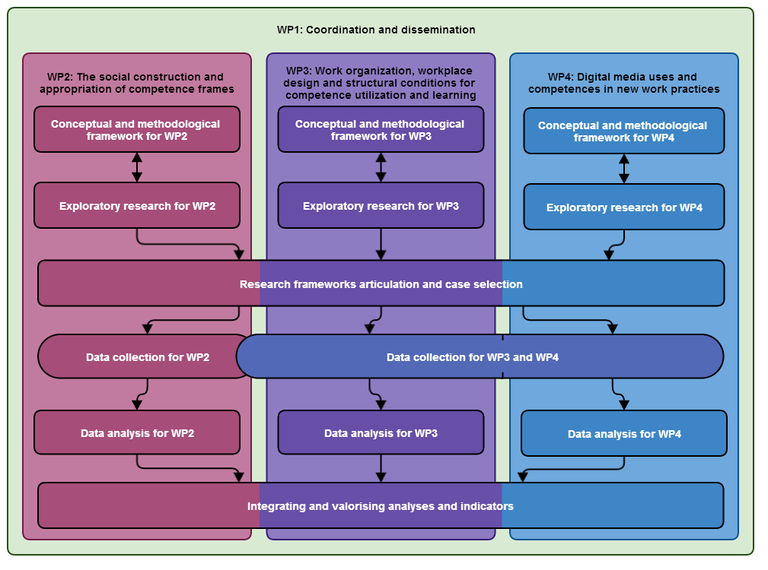Project
This research addresses the “digital turn” through the lens of digital and media literacy (DML) for office work, focusing specifically on teamwork and work at a distance.
Subject
Changing ways of working take shape at the crossroads of social and technical evolutions (cf. for instance the “Ecochange” project at the Federal Public Service Economy, SMEs, Self-Employed and Energy, and the “New World of Work” programme at the FPS Health, Food Chain Safety and Environment) and require a new range of competences – not only technical but also, and more importantly, social and communicational competences.
These competences will be the focus of LITME@WORK.
This lens will allow to get insights into how office workers use ICTs and what are the job demands, the needs and fears regarding DML competences.
It will also provide information about workers’ expectations, for instance in terms of opportunities for using and learning DML competences – all these being key aspects of the “digital turn” theme.
Issue
The work environment transformations, as visible in “new ways of working” initiatives in public and private organisations, create new DML requirements, for instance in terms of doing collaborative writing, managing personal and shared information, and managing a team at a distance. Against this background, the proposed research will ask:
- how is DML addressed and practiced in today’s office work?
- how can DML be further integrated in emerging team/distance work structures and practices in order to support efficient, stimulating and meaningful ways of working?
Objectives
1- Understanding changing work environments and their DML requirements
LITME@WORK aims at contributing to a better understanding of the changing office work environments, practices and DML requirements and opportunities as they take shape in different kinds of organisations and workplaces, from the perspective of workers. It also aims at understanding the ways through which DML requirements are addressed and dealt with by policies and organisations in different contexts (e.g. recruitment, assessment, training).
2- Developing a systematic approach to DML in team/distance office work
While the research is committed to approach DML in team/distance office work from the perspective of individual workers themselves, there is also a need for contextualising DML opportunities, uses and requirements as part of broader socio-technical arrangements within and across organisations and policy domains. The second objective of the research is therefore to approach DML from a range of perspectives opening up different levels of analysis, and to combine them into an integrated framework.
3- Providing resources for societal and policy stakeholders
The third objective of LITME@WORK consists in supporting societal and policy initiatives that somehow imply defining, evaluating, enhancing and/or recognizing DML in team/distance work. The partners involved in this research will provide stakeholders with a set of analyses, potential scenarios and indicators that will help them in making decisions and designing measures, for instance for organisational, monitoring and training purposes.
4- Contributing to research efforts in different fields
LITME@WORK situates itself at the crossroads of several research fields including: DML studies, science and technology studies (STS), sociology of innovation, sociology of uses, human-computer interaction studies, organisation theory, research on job quality and learning at work. As a fourth objective, this research aims at contributing to research efforts in these fields by extending the applicability of their respective concepts and methods and by developing interdisciplinary connections between them.
Methods
LITME@WORK will investigate the same object (DML competences) from three different but interrelated perspectives:
- the social configuration and appropriation of competence frames within and across organizations and policy domains (Work Package 2),
- the relationship between work organization, workplace design and structural conditions for competence utilization and learning (Work Package 3),
- the relationship between digital media uses and competences in employees’ new work practices (Work Package 4).

Each WP will use specific methods, related to its focus and theoretical framework, but the overall methodological structure will be the same across the WP, the case studies will be tightly coordinated and the final results will be integrated.
- Defining the theoretical and methodological frameworks. WP2, WP3 and WP4 will proceed to define the theoretical and methodological frameworks for their respective research separately.
- Exploratory research will be carried out to get basic knowledge about the studied organizations, their team/distance work practices and their approaches towards DML. This knowledge will help the research team (1) to familiarize themselves with the societal and policy agenda, (2) to adjust their theoretical and methodological frameworks to the researched field, and (3) to get better acquainted with contacts, networks, initiatives and controversies that are potentially relevant for moving the fieldwork forward (for instance concerning the choice of case studies).
- Research frameworks articulation. WP2, WP3 and WP4 share a common understanding of the notion of competence as related to intentional action: a competence becomes manifest in contexts where an individual acts towards a goal. Beyond this core understanding, WP2, WP3 and WP4 will approach DML from different theoretical and methodological perspectives. This genuine interdisciplinarity is one of the key added values of the project but it does require efforts to overcome the risk that each follow separate tracks. It is therefore crucial that all partners develop a common, overarching framework that will keep their work converging toward the same objectives. WP1 will organise the theoretical and methodological articulation of WP2, WP3 and WP4, with WP2 providing the broader context (i.e. how competences are socially configured and negotiated within and across organisations and policy domains), WP3 providing a theoretical account for the organizational context of DML competences utilization and development, and WP4 focusing on ICT use and DML competences from the perspective of workers.
- Case studies selection. Based on the integrated overall framework, the research partners will choose the case studies to work on, taking into account the respective objectives and needs of WP2, WP3 and WP4. Case studies will be selected among Belgian public and private organisations that have introduced changes in their work environment with the intention of enhancing teamwork and/or distance work with ICT, either several years ago (e.g. FPS Social Security, Mobistar) or more recently (e.g. FPS Mobility or FPS Public Health). Selecting the most informative cases will require the case study sampling to aim for a maximum variety in terms of the work organisation settings for both teamwork and distance work, as well as in terms of other criteria such as national vs. international scope, size of the organisation, etc.
- Data collection will be coordinated between the three WPs (as WP3 and WP4 will study the same cases, while there might be some overlap between WP2 and WP3), taking into account the practical aspects related to the bilingual scope of the research. This coordination will limit the overall burden for the organizations and respondents and foster a joint understanding within the research team. Overall, data collection will be carried out through document analysis (WP2 and WP3), in-depth individual interviews (WP2, WP3, WP4), direct observations (WP2, WP4) and questionnaires (WP3).
- Data analysis will be carried out separately for WP2, WP3 and WP4, across both languages. It will include discourse analysis of corpus material (WP2) and of recorded materials like interviews (WP2, WP3, WP4), as well as survey data analysis (WP3).
- Analyses and indicators integration. This task will consist in integrating analyses and indicators across WP2, WP3 and WP4. It will allow to better define the complementarity of the different analyses, conceptual maps and sets of indicators, to merge them into a single overarching framework and to align the WP contributions on the same structure and terminology. This will allow to analyse the worker competences in light of the standards of organisations, thereby contributing to reducing potential gaps between workers’ actual competences and their recognition by employers.
Expected research results
LITME@WORK will provide an up-to-date, encompassing knowledge of digital and media literacy (DML) in teamwork and work at a distance, which will enhance stakeholders’ understanding of DML and their capacity of taking actions in the area.
The following specific research results will contribute to this overall achievement:
- A research framework for analyzing the many aspects of DML in teamwork/distance work practices and environments, ranging from the broader context of competence frames configuration and appropriation to the role of organisational structures, workplace design and job characteristics in creating opportunities for competence utilization and learning, to the actual work practices and competences from the point of view of individual workers themselves.
- An in-depth analysis of the ways in which organizations and policies understand the “(digitally) competent worker”, looking at how frames of (DML) competences are configured and negotiated within and across organisations and policies domains, and how these frames shape/are shaped by concrete policies and activities such as describing jobs, recruiting new workers, selecting remote workers, designing training courses and monitoring ICT usage.
- An up-to-date description of the changing office work competences, practices and structures, with a focus on teamwork and distance work trends. LITME@WORK will focus on the nexus between DML requirements, work activities and organisational contexts providing opportunities and constraints for utilizing and learning DML competences.
- A conceptual map and a set of measurable indicators for DML competences aimed at serving as a resource for societal and policy stakeholders in terms of defining, evaluating, monitoring, recognizing and supporting DML in office work. This output will integrate the different aspects of DML as approached in LITME@WORK, thus combining key concepts and indicators (1) for an inclusive and participatory configuration of DML competence frames, (2) for organisation structures and job characteristics that create and sustain opportunities for DML competence utilization and learning, and (3) for the range of actual DML competences called for by today’s evolving world of work.





